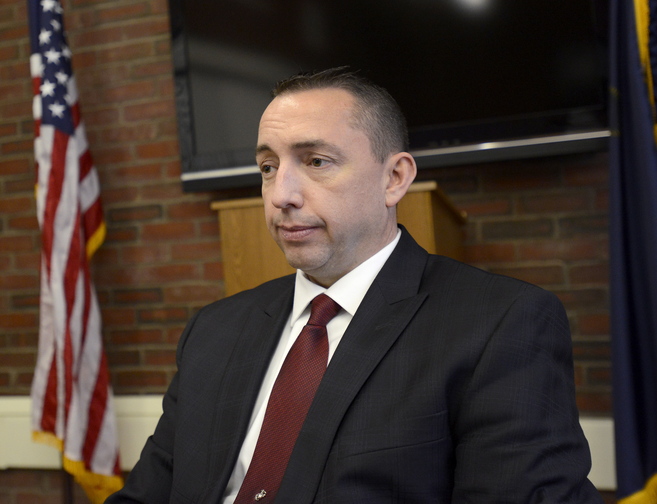Despite Portland voters’ overwhelming support for legalizing marijuana in the city, Police Chief Michael Sauschuck said Wednesday that his officers will continue to enforce state law, which prohibits possession.
“It’s a violation of state law and we will continue to enforce the state law,” he said.
However, he said, officers will continue to use discretion in deciding whether to issue court summonses for a variety of minor infractions, including marijuana possession.
“We’re going to deal with situations as they arise and as we come upon them,” Sauschuck said. “We’re not changing the way we do business.”
The ordinance approved Tuesday, by a vote of 9,921 to 4,823, may not have legal weight because it doesn’t pre-empt state law.
A similar situation arose in Denver when voters approved legalization in 2005, by a much tighter margin. Police continued to enforce the law at the urging of the mayor, said Mason Tvert, executive director of SAFER, the group that led the referendum campaign.
Voters responded two years later by passing a follow-up measure instructing police to treat marijuana possession as the department’s lowest enforcement priority.
“There’s absolutely nothing that requires (local police) to continue arresting adults for marijuana possession, for the same reason an officer could see you going 8 mph over the speed limit and not issue a citation,” Tvert said. “If they continue to arrest adults for possession, they are thumbing their noses at the voters.”
The ordinance approved Tuesday allows people 21 and older to possess as much as 2.5 ounces of marijuana within city limits. It requires Portland’s mayor to report annually to the City Council on police enforcement of marijuana laws.
Mayor Michael Brennan, who met with the city attorney and Sauschuck before the vote, said Wednesday that he does not believe the ordinance will have any immediate legal implications for enforcement.
“This is an expression of sentiment by the voters,” he said. “Police will continue to use discretion and good judgment in enforcing state and federal laws.”
Portland police issued 53 civil violations for marijuana possession from July 2012 to July 2013. About 68 citations were issued in the prior year.
Brennan said those relatively low numbers show that officers are not seeking out people to charge, and he believes that when they do, they must have good reason to take action.
Sauschuck said the department’s command staff determines which laws officers emphasize and where resources are allocated, based on community input and police experience and training. He said he will take Tuesday’s referendum results into account in that assessment.
The police department plans to release results this month from a survey of community attitudes about crime and public safety. The 40-question survey, which includes samples from each area of the city and various demographic groups, did not ask about marijuana possession but did ask about crimes often related to drug activity.
Sauschuck said a large percentage of the city’s street robberies, burglaries and thefts are results of people seeking money for drugs. Asked whether marijuana contributes to those crimes, as more serious drugs do, Sauschuck said: “I’m sure it contributes but not to the same level.”
Department officials will communicate with officers before the ordinance takes effect Dec. 6, Sauschuck said.
“If Portland voters want marijuana possession to be legal,” he said, “I would encourage voters to talk to their state legislators and federal representatives.”
Cumberland County Sheriff Kevin Joyce, who oversees the county jail in Portland, said deputies and corrections officers don’t enforce local ordinances in Portland, just state law, so the ordinance will have no bearing on them.
He said possessing marijuana on the jail grounds is a misdemeanor: possession of contraband. Marijuana, tobacco, alcohol, guns and other things are prohibited on jail grounds, he said, and visitors caught with them will be charged.
Stephen McCausland, spokesman for the Maine Department of Public Safety, said state troopers and detectives with the Maine Drug Enforcement Agency enforce state laws, which supersede local ordinances. But, particularly in the MDEA, detectives are focused on larger quantities than 2.5 ounces of marijuana, he said.
Under state law, possession of as much as 2.5 ounces of marijuana is a civil violation, not a crime. Portland’s ordinance will not legalize the sale or purchase of marijuana, or use of marijuana in public spaces.
One effect of Portland’s ordinance initially may be confusion and false expectations.
Sheriff’s Deputy Cole Chandler stopped a driver in Standish at 10:30 p.m. Tuesday and smelled marijuana. The 18-year-old driver said he had some pot, and Chandler confiscated marijuana and paraphernalia and wrote a citation.
“He thought it was ridiculous because they just legalized it in Portland,” Chandler said of the driver. “I basically told him it was still illegal, and he was not in Portland.”
David Hench can be contacted 791-6327 or at:dhench@pressherald.com
Send questions/comments to the editors.



Success. Please wait for the page to reload. If the page does not reload within 5 seconds, please refresh the page.
Enter your email and password to access comments.
Hi, to comment on stories you must . This profile is in addition to your subscription and website login.
Already have a commenting profile? .
Invalid username/password.
Please check your email to confirm and complete your registration.
Only subscribers are eligible to post comments. Please subscribe or login first for digital access. Here’s why.
Use the form below to reset your password. When you've submitted your account email, we will send an email with a reset code.